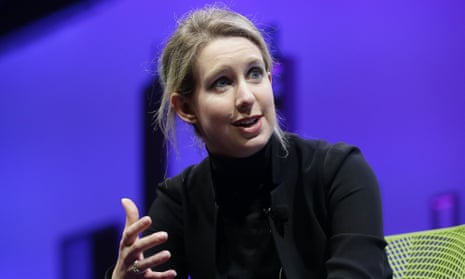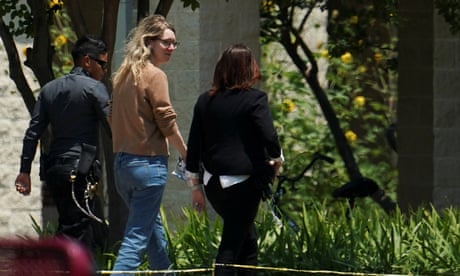CRIMINAL CAPITALI$M
‘People wanted to believe the fairytale’: the downfall of Elizabeth Holmes Elizabeth Holmes, founder and CEO of Theranos. Photograph: Jeff Chiu/AP
Elizabeth Holmes, founder and CEO of Theranos. Photograph: Jeff Chiu/APDisgraced founder of fraudulent blood-testing company Theranos begins prison sentence
Theranos founder Elizabeth Holmes begins 11-year sentence
Kari Paul in San Francisco
After scrutiny from regulators, Theranos started to retract its tests and recall its machines. Holmes stepped down as CEO in June 2018, with the company dissolving that same year.
Holmes settled with the US Securities and Exchange Commission (SEC), which accused her of an “elaborate, years-long fraud”. But the US government charged Holmes and Balwani with defrauding both investors and patients, and making false claims about the effectiveness of the company’s technology.
Delayed by the pandemic and the birth of Holmes’s first child, the media-hyped trial kicked off in August 2021. It would last four months, with the jury in the San Jose courtroom hearing testimony from former employees, investors like Mattis and Holmes herself.
In her testimony, Holmes argued she understood Theranos’s technology to be more accurate than it was and her defense team portrayed her as under the influence of Balwani.
Kari Paul in San Francisco
THE GUARDIAN
Tue 30 May 2023
Elizabeth Holmes has begun her prison sentence, in a remarkable fall for a startup founder who had become an icon known far outside Silicon Valley.
Holmes, 39, had once promised to revolutionize the medical world, but was convicted in January 2022 on four counts of defrauding investors in her blood-testing company, Theranos.

Theranos founder Elizabeth Holmes turns herself in for 11-year prison term
It was a stunning turn for an entrepreneur who had once riveted the tech world. Holmes dropped out of Stanford University in 2003 at the age of 19, set on developing a company that would turn upside down the field of medical diagnostics.
She had filed a patent for a technology that aimed to perform a wide range of tests on a small amount of blood, a development that would eliminate the need for large blood samples for diagnostics.
For years, Theranos operated in stealth mode. But by 2013, it started attracting widespread attention and Holmes became a media darling, easily recognizable with her distinctive blond hair, black turtlenecks and husky voice.
“Here was a photogenic, telegenic young woman posing as the female Steve Jobs,” Margaret O’Mara, a historian of Silicon Valley who holds a professorship at the University of Washington, said ahead of Holmes’s trial. “It was an incredibly alluring narrative that everyone wanted to believe.”
“Holmes was going to be the first woman who reached billionaire status and join the pantheon of tech leaders,” said John Carreyrou, the Wall Street Journal reporter whose investigation into the company was key to exposing its lies. “People were really rooting for her – young girls were writing her letters. A lot of people wanted to believe the fairytale, because it would have represented real progress in a very male-dominated world of Silicon Valley.”
Led by Holmes and her co-executive, and former romantic partner, Sunny Balwani, Theranos would end up raising hundreds of millions of dollars from investors. Big-name board members, including the former US secretary of defense James Mattis and former US secretaries of state George Shultz and Henry Kissinger, gave the company an air of legitimacy, even though behind the scenes it had little scientific proof to show for its claims. Theranos and Walgreens cut a major deal to distribute the company’s testing devices in pharmacies across the US.
At its height, Theranos was valued at more than $9bn and Holmes became the world’s youngest female self-made billionaire in 2015. That same year, however, the fairytale would start to fall apart.
It began with a 2015 article by Carreyrou that revealed Theranos’s revolutionary technology wasn’t exactly what it seemed. Over the succeeding months, Carreyrou exposed how the testing devices Holmes said could perform a variety of medical tests with just a drop of blood were not actually being used to perform most of the analyses.
Elizabeth Holmes has begun her prison sentence, in a remarkable fall for a startup founder who had become an icon known far outside Silicon Valley.
Holmes, 39, had once promised to revolutionize the medical world, but was convicted in January 2022 on four counts of defrauding investors in her blood-testing company, Theranos.

Theranos founder Elizabeth Holmes turns herself in for 11-year prison term
It was a stunning turn for an entrepreneur who had once riveted the tech world. Holmes dropped out of Stanford University in 2003 at the age of 19, set on developing a company that would turn upside down the field of medical diagnostics.
She had filed a patent for a technology that aimed to perform a wide range of tests on a small amount of blood, a development that would eliminate the need for large blood samples for diagnostics.
For years, Theranos operated in stealth mode. But by 2013, it started attracting widespread attention and Holmes became a media darling, easily recognizable with her distinctive blond hair, black turtlenecks and husky voice.
“Here was a photogenic, telegenic young woman posing as the female Steve Jobs,” Margaret O’Mara, a historian of Silicon Valley who holds a professorship at the University of Washington, said ahead of Holmes’s trial. “It was an incredibly alluring narrative that everyone wanted to believe.”
“Holmes was going to be the first woman who reached billionaire status and join the pantheon of tech leaders,” said John Carreyrou, the Wall Street Journal reporter whose investigation into the company was key to exposing its lies. “People were really rooting for her – young girls were writing her letters. A lot of people wanted to believe the fairytale, because it would have represented real progress in a very male-dominated world of Silicon Valley.”
Led by Holmes and her co-executive, and former romantic partner, Sunny Balwani, Theranos would end up raising hundreds of millions of dollars from investors. Big-name board members, including the former US secretary of defense James Mattis and former US secretaries of state George Shultz and Henry Kissinger, gave the company an air of legitimacy, even though behind the scenes it had little scientific proof to show for its claims. Theranos and Walgreens cut a major deal to distribute the company’s testing devices in pharmacies across the US.
At its height, Theranos was valued at more than $9bn and Holmes became the world’s youngest female self-made billionaire in 2015. That same year, however, the fairytale would start to fall apart.
It began with a 2015 article by Carreyrou that revealed Theranos’s revolutionary technology wasn’t exactly what it seemed. Over the succeeding months, Carreyrou exposed how the testing devices Holmes said could perform a variety of medical tests with just a drop of blood were not actually being used to perform most of the analyses.
After scrutiny from regulators, Theranos started to retract its tests and recall its machines. Holmes stepped down as CEO in June 2018, with the company dissolving that same year.
Holmes settled with the US Securities and Exchange Commission (SEC), which accused her of an “elaborate, years-long fraud”. But the US government charged Holmes and Balwani with defrauding both investors and patients, and making false claims about the effectiveness of the company’s technology.
Delayed by the pandemic and the birth of Holmes’s first child, the media-hyped trial kicked off in August 2021. It would last four months, with the jury in the San Jose courtroom hearing testimony from former employees, investors like Mattis and Holmes herself.
In her testimony, Holmes argued she understood Theranos’s technology to be more accurate than it was and her defense team portrayed her as under the influence of Balwani.
Still, the jury convicted her of four counts of defrauding investors, and in November 2022 she was sentenced to serve more than 11 years in prison.
Holmes’s conviction was a crucial moment in Silicon Valley, the central hub of an industry where the ethos of “fake it till you make it” has reigned for years.
The Silicon Valley investor Jason Calacanis, who was an early backer of major firms like Uber and Robinhood, said the verdict was a “reminder to founders”.
“Never lie, never bend the truth, always be honest about where you are at with your traction, especially when raising money,” he tweeted.
It was also an important moment for workers in the sector. Several former Theranos employees testified during the trial they had long suspected the company could not deliver on its promises, but felt they could not raise questions and risked being sued if they spoke out.
Holmes had been out on bail since she was indicted, and after her sentencing had unsuccessfully argued she should be able to remain out of custody while she sought a new trial.
In her last weeks of freedom, she broke her media silence with an extensive profile in the New York Times about her time at Theranos, her mistakes as an entrepreneur, and her life as a mother and partner to her husband, Billy Evans.
Holmes is serving her sentence at the federal prison camp Bryan, a minimum-security facility in Texas. Under federal law, she’s required to serve 85% of her sentence, even if it is reduced for good conduct. She faces three years of supervised release after her sentence ends and has been ordered to pay $452m in restitution to victims of the fraud.
Bryan prison houses primarily white-collar and non-violent female prisoners, and lacks the fencing and strict rules of higher-security prisons. It is a work-focused program that requires all inmates to hold a job for a minimum of 90 days.
Holmes’s conviction was a crucial moment in Silicon Valley, the central hub of an industry where the ethos of “fake it till you make it” has reigned for years.
The Silicon Valley investor Jason Calacanis, who was an early backer of major firms like Uber and Robinhood, said the verdict was a “reminder to founders”.
“Never lie, never bend the truth, always be honest about where you are at with your traction, especially when raising money,” he tweeted.
It was also an important moment for workers in the sector. Several former Theranos employees testified during the trial they had long suspected the company could not deliver on its promises, but felt they could not raise questions and risked being sued if they spoke out.
Holmes had been out on bail since she was indicted, and after her sentencing had unsuccessfully argued she should be able to remain out of custody while she sought a new trial.
In her last weeks of freedom, she broke her media silence with an extensive profile in the New York Times about her time at Theranos, her mistakes as an entrepreneur, and her life as a mother and partner to her husband, Billy Evans.
Holmes is serving her sentence at the federal prison camp Bryan, a minimum-security facility in Texas. Under federal law, she’s required to serve 85% of her sentence, even if it is reduced for good conduct. She faces three years of supervised release after her sentence ends and has been ordered to pay $452m in restitution to victims of the fraud.
Bryan prison houses primarily white-collar and non-violent female prisoners, and lacks the fencing and strict rules of higher-security prisons. It is a work-focused program that requires all inmates to hold a job for a minimum of 90 days.
No comments:
Post a Comment